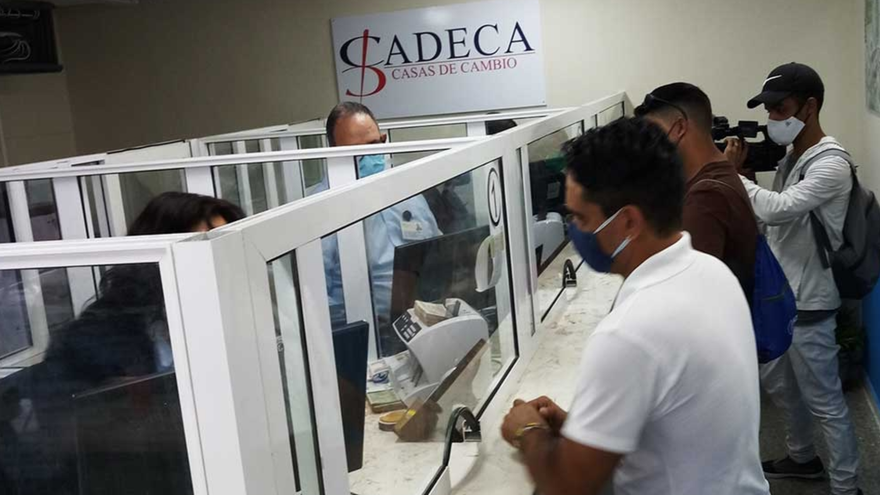
![]() 14ymedio, Havana, 17 June 2021 — The Cuban banking system has devised a new option to keep the foreign currency of tourists, who can acquire, starting this Tuesday, Prepaid Cards at the Cadeca currency exchange offices in Varadero and Cayo Coco.
14ymedio, Havana, 17 June 2021 — The Cuban banking system has devised a new option to keep the foreign currency of tourists, who can acquire, starting this Tuesday, Prepaid Cards at the Cadeca currency exchange offices in Varadero and Cayo Coco.
The cards, of 200, 500 and 1,000 dollars, are only for non-resident travelers, who can buy them by presenting their passport and depositing the amount in cash plus a commission of five dollars, only until the 20th. After that they may do so in any other currency among those accepted in the country.
Prepaid cards can only be spent within Cuba and will be valid for two years. Travelers will thus be able to make purchases in hard currency stores without cash, although they can also withdraw Cuban pesos at ATMs. What they do not allow are transfers from abroad, or deposits or movements of funds between similar cards or others that operate in dollars. And unspent balance is non-refundable in foreign currency.
Last Friday, the first vice president of the Central Bank of Cuba (BCC), Francisco Mayobre Lence, explained on television that travelers who arrive on the island after June 21 will not be able, like nationals, to exchange dollars in cash, and so must arrive with a different currency to cover their expenses or use an international card accepted in the Cuba (the embargo does not allow the use of cards issued in the United States).
The new product could solve some of these problems, but it is to be expected that other problems will occur. The measure has not been well received by Cubans residing in the country, who speculate, in social networks and the official press, about the difficulties that this may have for tourists.
“So, does the tourist who comes with dollars after June 20 have to eat them? Can’t he buy these cards? Will the tourist be forced to come to Cuba with a currency other than the USD?” asks a Cubadebate reader to which another responds: “Cuban inventions. Apparently they forgot that there is competition in the Caribbean.”
Some users fail to imagine tourists lining at a Cadeca and believe it is very possible that a black market for dollars will continue to circulate. Meanwhile, others ask insistently if, since the use of the cards is not limited to the personwho acquired them, anyone will be able to use them, a doubt that reveals the aspiration of many to get one of these products by any means.
Last Thursday the government announced by surprise that it would stop accepting cash in US dollars. Yesterday, the General Customs of the Republic issued a statement clarifying that this also affects the payment of customs duties and services for items imported at the border, which can only be paid in currencies other than the United States or by card.
The agency has asked Cubans to take steps to avoid acting out and comply with regulations without giving up import rights.
Cubans and economists debate the reasons for this decision by the authorities, arguing that they have huge amounts of dollars in cash stuck in banks because they are not able to operate internationally with them. The foreign currency stores, which increasingly provide more goods, even basic goods, to Cubans and, at the same time, are more scarce every day, lack products due to the impossibility of buying with all the cash they collect, due to the US sanctions, which prevent them from moving the money, argues the Government.
Critics doubt this argument and offer other hypotheses, together or in combination, ranging from an attempt to pressure the Biden government to relax sanctions through pressure from families who send remittances, to money laundering through a desperate attempt to get hold of as much US currency they can collect, in record time.
Another theory suggests that it is a matter of curbing the rise in the price of the dollar in the informal market. Exchange houses sell dollars at a rate of 1 x 24 Cuban pesos, while in illegal networks the rate has reached 70.
____________
COLLABORATE WITH OUR WORK: The 14ymedio team is committed to practicing serious journalism that reflects Cuba’s reality in all its depth. Thank you for joining us on this long journey. We invite you to continue supporting us by becoming a member of 14ymedio now. Together we can continue transforming journalism in Cuba.
